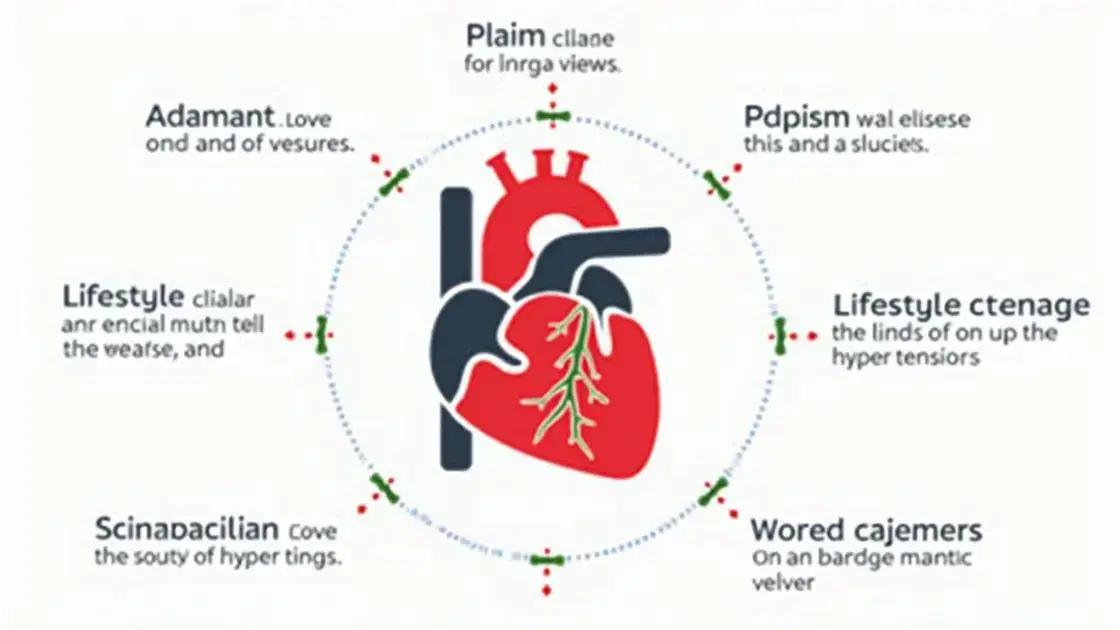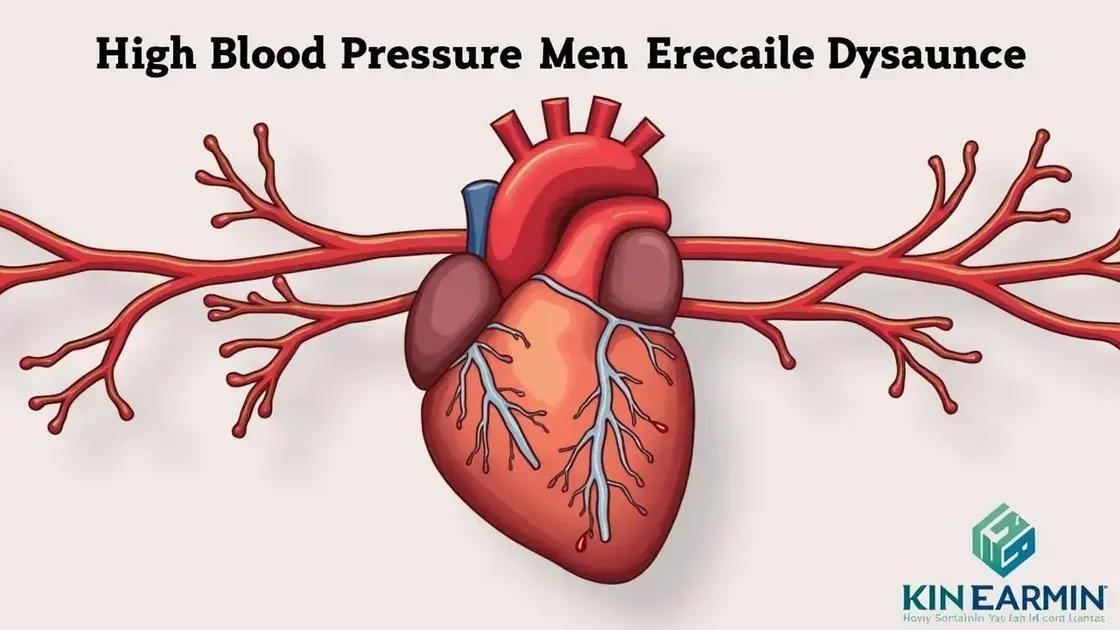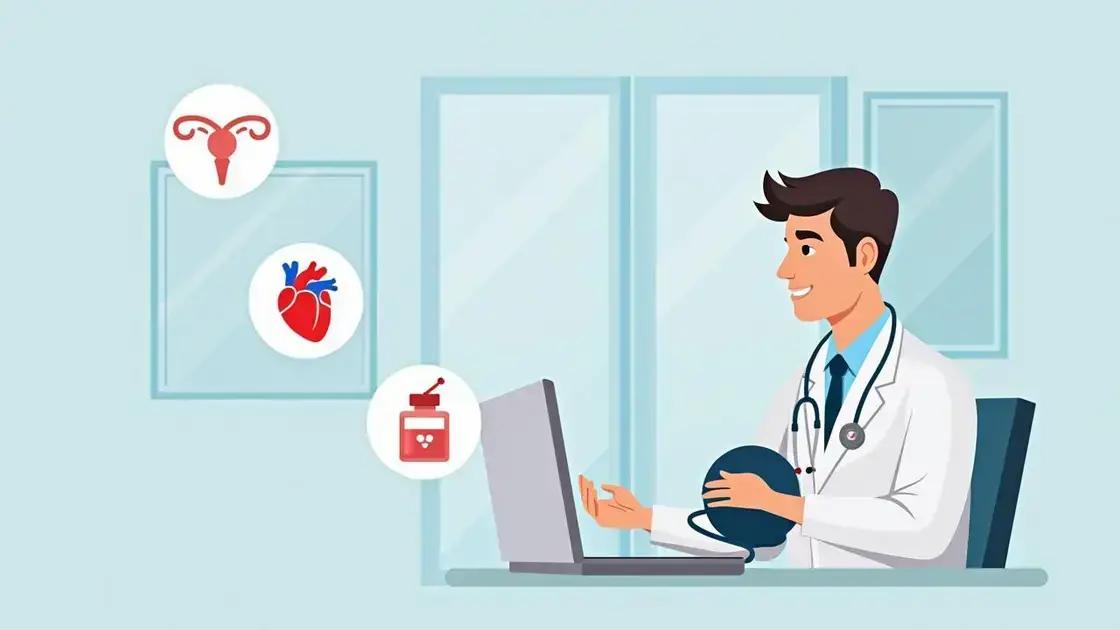High blood pressure can significantly contribute to erectile dysfunction by damaging blood vessels and reducing blood flow to the penis. Lifestyle changes such as a healthy diet, regular exercise, and stress management, alongside discussing symptoms with a healthcare provider, can help manage both blood pressure and erectile dysfunction effectively.
High blood pressure affects many aspects of health, including sexual function. Understanding how it contributes to erectile dysfunction (ED) can help men better manage their overall well-being. This article delves into the connections between high blood pressure and ED, highlighting important insights for maintaining a healthy sex life and exploring potential lifestyle changes and treatments.
Understanding High Blood Pressure and Its Risks

High blood pressure, or hypertension, is a common condition that affects many people worldwide. It occurs when the force of your blood against the walls of your arteries is consistently too high. This condition can lead to serious health risks if left untreated.
What Causes High Blood Pressure?
There are several factors that can cause high blood pressure, including genetics, unhealthy diets, lack of physical activity, and excessive alcohol consumption. Managing these factors is crucial to maintaining a healthy blood pressure level.
Risks Associated with High Blood Pressure
If not managed properly, high blood pressure can lead to various health complications such as:
- Heart Disease: Hypertension increases the workload on the heart, potentially leading to heart disease.
- Stroke: Elevated blood pressure can cause blood vessels in the brain to rupture or become blocked.
- Kidney Damage: High blood pressure can harm the kidneys, affecting their ability to filter waste from the blood.
- Vision Loss: It can cause damage to the blood vessels in the eyes, leading to vision problems.
Prevention and Management
Maintaining a healthy lifestyle can be key in preventing and managing high blood pressure. Regular exercise, a balanced diet low in salt, and avoiding tobacco can contribute to better blood pressure outcomes.
In summary, understanding high blood pressure and its associated risks is fundamental for overall health. Being aware of how it affects the body can aid in taking necessary precautions to mitigate its impact.
The Link Between High Blood Pressure and Erectile Dysfunction

High blood pressure has been linked to erectile dysfunction (ED) in many studies. When blood pressure is consistently high, it can cause damage to blood vessels. Healthy blood flow is vital for achieving and maintaining an erection. If the blood vessels are damaged, it becomes more difficult for blood to flow into the penis.
How High Blood Pressure Affects Blood Flow
The arteries can become stiff and narrow due to high blood pressure, a condition known as atherosclerosis. This narrowing limits blood flow throughout the body, including the genital area. A reduced blood supply can lead to difficulty achieving an erection or reduced sexual desire.
Inflammation and Stress
High blood pressure can cause inflammation in the body, which may also affect erectile function. Additionally, the stress of dealing with hypertension can contribute to anxiety, impacting sexual performance. Psychological factors often play a significant role in ED.
Hormonal Changes
Another factor to consider is that high blood pressure can lead to hormone changes, such as reduced levels of testosterone. Low testosterone is linked to decreased libido and erectile dysfunction. Understanding this relationship is essential for men suffering from ED.
Many men do not realize the impact high blood pressure can have on their sexual health. Recognizing these links can help in seeking appropriate treatment options and making lifestyle changes.
How Blood Pressure Medications Impact Sexual Health

Blood pressure medications are often necessary for managing hypertension, but they can also impact sexual health in various ways. Some common types of medications include diuretics, beta-blockers, and ACE inhibitors. Each of these can have differing effects on libido and erectile function.
Diuretics
Diuretics, also known as water pills, can reduce blood flow to the penis. While they help remove excess fluid and lower blood pressure, they may lead to decreased sexual desire or erectile dysfunction as a side effect due to reduced blood flow.
Beta-Blockers
Beta-blockers are frequently prescribed for heart issues, but they can also affect sexual performance. Many men report issues such as a lower libido and difficulty achieving an erection while on these medications. However, the response to these medications can vary by individual.
ACE Inhibitors
ACE inhibitors are less likely to cause sexual side effects compared to other classes of blood pressure medications. However, some patients may still experience erectile dysfunction. It is essential to communicate any side effects with your healthcare provider for potential adjustments.
Medication Adjustments
It’s important for patients to consult their doctors if they encounter sexual health issues while taking blood pressure medications. Sometimes, adjusting the dose or switching to a different medication can alleviate these side effects. Managing high blood pressure shouldn’t come at the cost of sexual health.
Understanding the implications of blood pressure medications is vital. By being aware of potential side effects, patients can work with their healthcare providers to find the best treatment plan.
Lifestyle Changes to Manage Blood Pressure Effectively

Making lifestyle changes is crucial for managing blood pressure effectively. These changes can improve overall health and may also have a positive effect on erectile function. Here are some recommendations to consider:
Eat a Healthy Diet
A balanced diet can greatly impact blood pressure. Focus on consuming fruits, vegetables, whole grains, and lean proteins. Limiting salt intake is also important. Try following the DASH diet (Dietary Approaches to Stop Hypertension), which aims to reduce blood pressure through dietary changes.
Maintain a Healthy Weight
Being overweight can contribute to high blood pressure. Losing even a small amount of weight can lower blood pressure significantly. Aim for a body mass index (BMI) within the healthy range by combining diet with regular exercise.
Regular Physical Activity
Regular exercise can help manage weight and reduce blood pressure levels. Try to engage in at least 150 minutes of moderate aerobic activity each week. Activities like walking, jogging, swimming, or cycling can be beneficial.
Limit Alcohol and Quit Smoking
Excessive alcohol consumption can raise blood pressure. It is advisable to limit intake to moderate levels. On the other hand, quitting smoking has numerous health benefits, including lowering blood pressure and improving overall circulation.
Manage Stress
Stress can contribute to high blood pressure; finding effective stress management techniques is essential. Practices such as yoga, meditation, and deep breathing exercises can help reduce stress levels.
By incorporating these lifestyle changes, individuals can take active steps towards managing their blood pressure and improving sexual health.
Seeking Help: When to Talk to Your Doctor About ED

Discussing erectile dysfunction (ED) with a doctor can feel uncomfortable, but it is essential for overall health. If you are experiencing symptoms, consider speaking to your healthcare provider. Here are some key points on when to seek help:
Persistent Symptoms
If you regularly have trouble getting or maintaining an erection, it is time to talk to your doctor. Occasional issues can happen, but when it becomes a regular occurrence, it may signal a deeper health issue.
Changes in Sexual Desire
A noticeable change in libido can be concerning. If you find that your interest in sex decreases significantly, it may be linked to underlying conditions such as high blood pressure or hormonal imbalances.
Health Conditions
If you have existing health problems like high blood pressure, diabetes, or heart disease, it is particularly important to discuss any sexual health issues with your doctor. These conditions are often related to ED.
Medication Side Effects
If you are taking blood pressure medications and notice sexual difficulties, let your doctor know. They can help adjust your treatment plan to minimize side effects.
Emotional and Mental Well-being
Psychological factors such as stress, anxiety, and depression can also affect sexual function. If you feel that these issues are impacting your sex life, bringing them up with your doctor can lead to effective strategies for management.
Seeking help early can lead to more effective treatment options and improve your quality of life. Don’t hesitate to reach out to your healthcare provider about ED and related concerns.
In Summary: Understanding High Blood Pressure and Erectile Dysfunction
High blood pressure is a serious health issue that not only affects overall health but can also lead to erectile dysfunction. Recognizing the connection between these conditions is vital for effective management and treatment.
Implementing lifestyle changes, understanding the impacts of medication, and seeking timely help from your doctor are essential steps toward improving both blood pressure and sexual health.
Through informed actions and open discussions with healthcare providers, individuals can take control of their health, leading to better outcomes and an improved quality of life.
Don’t hesitate to reach out for support—your health is worth it.
FAQ – Frequently Asked Questions About High Blood Pressure and Erectile Dysfunction
What is the relationship between high blood pressure and erectile dysfunction?
High blood pressure can damage blood vessels, reducing blood flow to the penis and making it difficult to achieve or maintain an erection.
How can lifestyle changes help manage high blood pressure?
Adopting a healthy diet, exercising regularly, maintaining a healthy weight, and reducing stress can significantly lower blood pressure levels.
When should I talk to my doctor about erectile dysfunction?
If you experience persistent difficulty with erections, changes in libido, or if you have health conditions like diabetes or high blood pressure, it’s important to seek medical advice.
Are there medications that can affect sexual health?
Yes, some blood pressure medications such as diuretics and beta-blockers can cause erectile dysfunction as a side effect.
What are some effective treatments for erectile dysfunction?
Treatments can vary and may include medication, lifestyle changes, therapy, or addressing underlying health conditions.
Can stress impact erectile dysfunction?
Yes, stress and anxiety can contribute to erectile dysfunction. Managing stress through relaxation techniques and open communication with your partner can help.












